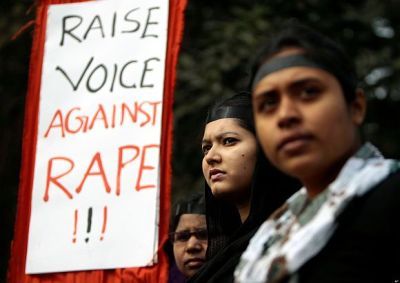 The change needed to prevent violence against women in India -- and across the world -- must be systemic, cultural change, not reciprocal violence to individual acts of barbarism, says Mallika Dutt.
The change needed to prevent violence against women in India -- and across the world -- must be systemic, cultural change, not reciprocal violence to individual acts of barbarism, says Mallika Dutt.
On September 13, a New Delhi judge -- based on a guilty verdict days earlier -- sentenced to death the four men convicted of the December gang-rape and murder of a 23-year-old girl.
Crowds cheered as the collective cry from the majority of the public to 'hang the rapists' was answered. The girl's mother remarked that her daughter's dying wish was to see her attackers hanged.
Others had insisted on a public execution to reinforce the preventative motive of the sentence. The death penalty may quench, for some, a thirst for a particular -- and highly limited -- type of justice. The Delhi rape and murder rightly sowed rage, and I can understand the impulse for such retribution, especially on the part of her parents.
But the death of the perpetrators will do little to change the 'lives' of women in India, today or tomorrow. The fact is, addressing and responding to violence with more violence is not only wrong, but it is ineffective in preventing violent crime. There is much conclusive -- if limited -- scholarship on the death penalty's role as a crime deterrent.
A majority of criminologists and police chiefs say the death penalty is much more a symbolic political tool than an actual deterrent (external link). Law enforcement overwhelmingly agreed that a 'better economy and more jobs' are a stronger deterrent of violent crime than 'expanded use of the death penalty'.
Indeed, the change needed to prevent violence against women in India -- and across the world -- must be systemic, cultural change, not reciprocal violence to individual acts of barbarism.
Indian litigator Karuna Nundy, quoted in The New York Times, echoed this sentiment well, saying, 'I think a lot of people were hugging each other because they thought this evil is localised, and it will be wiped out, and that is not the case. The sad truth is that it is not a deterrent.'
Real deterrents include appropriate policing, accountable government, and effective implementation of laws. But more than that, the best deterrent to rape is culture change: Bold, steady, and persistent challenges to the norms and biases that enable and excuse violence against women.
We need to make violence and discrimination against women socially and culturally unacceptable, in India and beyond -- not just in the spectacular cases, but in our everyday lives, homes, and interactions.
To hang these men does not even begin to address the scale of the problem. If we gave the death penalty to every perpetrator of sexual violence, we would inevitably be hanging people we know -- members of our communities.
Media reports indicate that victims knew their offenders in over 94 percent of reported rape cases in India. They were husbands, parents, husbands, neighbours. To bring about a more equitable and safe world for women and girls, we must change hearts and minds in our communities, in our homes.
We cannot make the degradation of women and girls unacceptable simply by 'weeding out' the bad apples. So yes, we should be taking to the streets, but not to call for more death. Instead, we should be demanding change from a culture that treats women and girls as less than.
The groundswell of attention and action pouring out onto the streets of Delhi and beyond in the wake of the gang-rape gave -- and continues to give me -- hope. We have spoken to dozens of young men on the streets of Delhi who have not only spoken out against acts of violence against women, but the inequitable conditions that they know cause them.
This greater involvement of men in the protests has signalled a tipping point in the ways in which all genders are standing up to demand that no single person be denied their human rights. That means the right to live in a society without fear of violence -- whether you are a young woman riding the bus home or one of four young men on trial for rape and murder.
And it is not just the type of violence right in front of us, or the kind that may get the media attention of the Delhi gang-rape and murder, or any of the subsequent highly publicised acts of sexual violence against women. We also need to dismantle the biases that send girls into dangerous early marriages, that prevent girls from being born -- leaving some communities in India with so few girls that they must be trafficked in for men to marry.
Men need to stand shoulder to shoulder with women to demand and make that change, too. We need more fathers like the one in Jharkhand -- who took his daughter back from her marriage at 13 when he found out she was being abused -- to become the norm. Now he publicly stands against early marriage, talking his relatives out of following the practice.
That is the kind of sustainable change we really need -- where human rights begin and live in every home and all people are able to reach their full potential.
Making behaviour punishable by death is not a deterrent. Making behaviour absolutely unconscionable is -- and that starts with changing how India as a society -- indeed, how all of us -- views and treats women and girls.
And as long as the meaningful, lasting dialogue sparked last December continues, whatever the fates of her attackers, I don't think the Delhi girl's death will be in vain. Or as journalist Nilanjana S Roy succinctly put it (external link): 'The rapes might not stop; but this conversation isn't stopping either.'
Mallika Dutt is the Founder, President and CEO of Breakthrough, a global human rights organisation that 'uses the power of media, pop culture, and community mobilisation to promote human rights values.'











 © 2025
© 2025